“When Ben calls you up, you don’t even need to read the script”: Chris Messina, Ben Affleck, Chris Tucker, Jason Bateman and Matthew Maher on Air
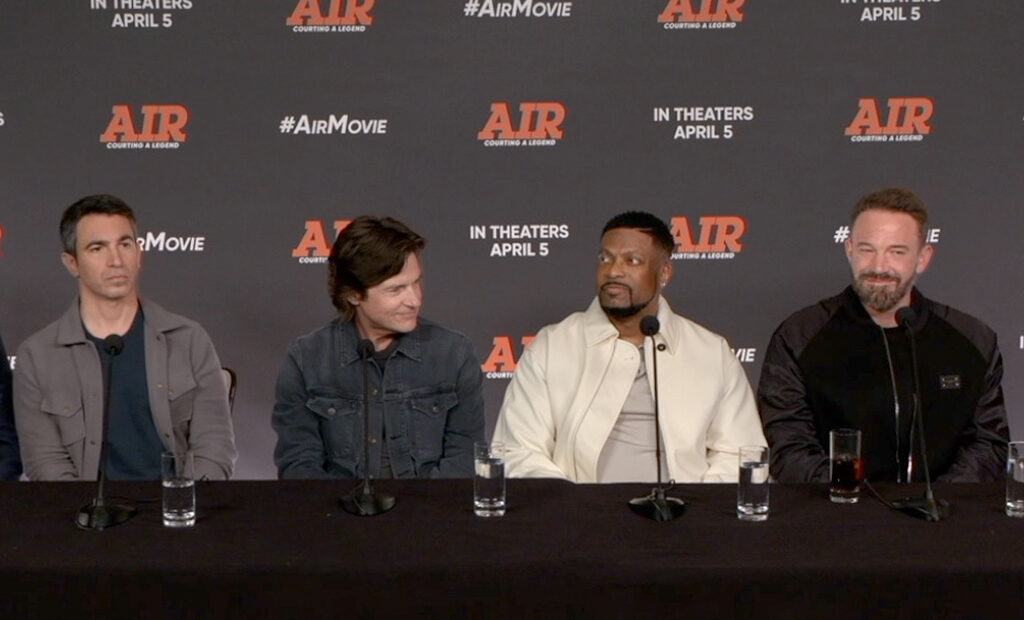
If, like this writer, your knowledge of basketball only ever really consisted of your knowledge of Michael Jordan, that is a testament to the level of fame the athlete has garnered over the course of his lifetime, as only a few individuals do, surpassing all boundaries of his sport and his nationality to become a renowned face and name the world over. Then, even for the newer generation who didn’t grow up in the era he so dominated, mid-pandemic bingeworthy Netflix series The Last Dance was a thorough deep dive into the man and the legend and his impact on our culture, as well as an education for those of us for whom American sports are something of an enigma.
Into that backdrop, then, comes Ben Affleck’s Air. On paper, there’s not much to it. It pulls a single thread that’s mentioned in countless documentaries about Jordan, and that is his lucrative collaboration with Nike to create the Air Jordan trainers. Is that really an interesting topic for a feature film, you may ask yourself? Especially one that puts front and centre the corporate workers and their backstage handling of the process of landing a deal with Jordan. And yet, it’s 100% an immersive, tantalising and inspirational watch.
So what’s to love? For those who grew up obsessed with the duo that is Affleck and Matt Damon in the likes of Good Will Hunting and Dogma, seeing the pair on screen again together as Nike co-founder Phil Knight and maverick salesman Sonny Vaccaro is just effortlessly entertaining cinema. Then we’ve got the always-excellent Jason Bateman and solidly hilarious Chris Tucker as Damon’s coworker and boss, and Chris Messina, as a deliciously enraged foul-mouthed agent, in the mix, who all bring their renowned comic timing and less obvious pathos to their roles. To top it off, the one and only Viola Davis plays Jordan’s tenacious mother Deloris (a non-negotiable condition of Jordan’s for the film to be made apparently). And who plays Jordan himself? In a clever move, the usual star is kept as a silhouette of sorts, allowing focus to remain resolutely on the machinations happening around him, and the untold aspects of this underdog story to surface. The icing on the cake is the full-blown nostalgia-fest of the 80s sets and costumes, an undisputed highlight being Affleck’s get-up as Phil in cerise pink running shorts and leggings. Oh, and his metallic purple Porsche.
Ahead of the film landing in cinemas, The Upcoming had the pleasure of joining the stars and creators for a virtual press conference to hear more about the making of the movie, including Affleck, Tucker, Bateman, Messina and Matthew Maher, who plays shoe designer Peter Moore.
You’ve just come off an incredible premiere at SXSW, and Ben, you have many roles on this film. But let’s start with Chris: this was such a great performance, but it was also a collaboration, and when you came onto this project, this was definitely something that both Ben and Matt and everyone wanted, to show what part Howard played in this incredible story.
Chris Tucker: Yeah, it was so much fun. Ben told me right up front, “It’s like making a movie with friends and having fun.” I knew Howard White, so I had all access to him, talking with him for hours, and everybody he mentored, like Charles Barkley and people from his childhood he played Hopscotch with, teachers, and coaches – I really got a lot of information together to embody his spirit, his dialect, and put it all together and put it into character. Everybody said he was like Confucius, this nice guy who thought about the world, glass half full instead of half empty. I wanted the character to be positive and just be a lot of fun.
Jason, when Ben asked you to be a part of this, you were probably maybe wrapping Ozark, a little job that you’ve been doing for the past few years, a few Emmys under your belt for that one. But what was the attraction? Was it the sports aspect of it or was it the early days with that script? Because your character has one of those great scenes where you wouldn’t mind what else you do in the movie to have a moment like that…
Jason Bateman: To be honest, the draw was really Ben, it was Matt, and the subject matter. While, yes, it was a big deal for people my age… I was 15, 16, when Jordan came into the league, the shoes, and everything like that, I’m a big sports fan, and that was a big draw. But it’s really the people that you work with is a big draw for us, as it’s 12 hours a day. You spend more time on the set than you do at home, so that was a big pull for me. I loved it. As far as that scene goes, there’s a lot of really great writing in this movie, and that scene’s definitely one of them. They did all the tough work there. I just got the lines right and sat on the right mark.
Ben, this was another time where you’re both directing, working on the screenplay, acting. There’s your love of sports, your love of filmmaking, and then also bringing your film family, with Matt Damon, along with it. You didn’t add just one aspect to this that made it complicated; it seemed like it was everything.
Ben Affleck: I can see how it would seem that way, but actually, for me, it was made so much easier because this is a group of people who either I had known for a long, long time and had an enormous amount of respect and regard for, like Matt Mayer, Chris Messina, and obviously Matt Damon, and Jason Bateman, all of whom I’ve worked with multiple times and know well and adore and admire, or people who had been my life’s goal to work with, like Viola Davis and Chris Tucker. I think Chris can attest to the number of times I’ve harassed him, like he passed me by in a hotel lobby, “Chris, Chris, I want to do a movie with you!” Finally, I got Jordan to bring him around, or the Jordan subject matter. Chris is really being humble. He came in and created this role, and I said, “I need you as a collaborator, filmmaker, your voice, your experience, your perspective. This movie is a massive failure if it’s just my voice and my experience and perspective.” Chris, and Howard, and Viola, and Marlon, and everybody who brought, what Jason brought, all those things are invaluable to telling a story. So it’s actually kind of like walking on air!
JB: I like how you worked air into it…
Chris Messina, the SXSW crowd were cracking up with everything that you were doing with your character. You do angry on the phone very well, it was highly entertaining. Considering that, was that a daunting aspect of joining this one, just the fact that you’re so separated from the story but so essential to it as well?
Chris Messina: You know, when Ben calls you up, you don’t even need to read the script because I’ve gotten to work with him now three times. It’s always an amazing experience; it’s always surrounded by great artists in front of the camera and behind the camera. When I read it, and I loved it, I was like, “Oh shit, these are a lot of phone calls.” But Ben did something that I’ve never done in my career and I’ve done a lot of phone calls. Usually, you call the other actor, the phone disconnects, or a script supervisor does it with you. But Matt and I were down the hallway from each other. We each had three cameras on us, and Ben would go back and forth from room to room. We’d all get together, and we had a blast doing it. The script was amazing but we could play; we could overlap; we could improvise. It was great. I keep saying this: the hardest part of doing this job is going on to the next one, leaving these guys behind, because the way Ben puts together a team of people is phenomenal, and you get very spoiled.
Ben, talk about that because this does feel like a coach assembling a team. The other aspect was how much you spoke about the task of the Viola Davis of it all, and getting that assignment from Michael Jordan.
BA: I really didn’t understand the movie, actually, as it turned out, until I went to speak to Michael, because I’ve been lucky enough to cross paths with him a few times. I’m not going to act like me and him are friends, I just idolise the guy, and every now and again, I’ve had a chance to spend time with him. It’s been very memorable for me, probably he’s forgotten it! But I had at least enough of an in to say, “Hey, you know, can I come see you and just kind of run this past you?” Because to be honest, from a point of view of respect for him, his family, who he is, and what he means, from a selfish point of view for the movie, the stupidest thing in the world would be to go make a movie that involves him – it doesn’t actually feature him, but nonetheless it invokes his name and tells a part of his story – that he was opposed to. So if he said, “Don’t do it,” I was just going to not do it, and that would be that. You know, end of the conversation. I was very prepared for that to be the result of that because I had no reason to think that he would be open to it or welcome it, particularly since it wasn’t the Michael Jordan story where we had bought his rights and that sort of thing, which I would think might be discomforting. However, what I found was that he was very gracious, and actually when I said, “Look, this is not historically accurate, in the sense that I can’t dot every ‘i’ and cross every ‘t,’ and I don’t know what time every phone call was made. This is going to have to be something of a fable, a parable, an inspiring story, and so I’m going to take liberties in order to make it an hour and 30-40 minutes. But I don’t want to violate anything that’s fundamentally important or true to you, so if you would, please tell me what those things are, and I promise you they’ll be sacrosanct.” I think it was telling that he did; he wasn’t somebody who was like, “Well, we’ve got to talk about when I did this and I did that,” which there are people who take that approach. He only talked about other people; he wanted to make sure that other people who were meaningful were included in the story. George Raveling was one of them, which was why Marlon’s role is in the movie. Again, I brought Marlon in, he helped me figure this out, researched this, and found out about the King speech story, that being true. Then, he also said Howard White was integral to this, and so my first thought was, “Finally, I’m going to maybe get Chris Tucker.” And then I asked, “What was your dad like?” And he said…because initially, to be honest, I was going to have it be a story about Michael himself saying, “This is what I’m worth; this is what I deserve,” a person saying, “This is what I mean, and I’m going to ask for that.” And he said, “My dad had the best personality in the world.” And I think with Julius, we got exactly that, the perfect person. And then he said, “You know, I didn’t want to go to Portland. I would have signed my shoe rights away for life for a red Mercedes. My mum told me to go to Nike.” And when I saw how he talked about his mother, and the regard and esteem in which he held her, this is a very intimidating, powerful man. I’ve never seen Michael Jordan any other way. I mean, he really is like being on Olympus; you’re around somebody who is as close to a deity as you’re going to find. And yet, there was this moment where I saw an awe, and a reverence, and respect, adoration, and love when he talked about his mother. It just struck me, and shame on me for not assuming this was the case. But when I heard it, I realised right away that this is the story, and this is a beautiful story. It’s a story about Deloris Jordan and what she means to Michael, and that she’s emblematic of what so many mothers must have meant to so many athletes and entertainers and people in this business who are oftentimes very young and thrust into a world of fame and money, and that can be confusing. We see people take different roads all the time, and it must require an enormous amount of guidance. So, I thought, “Actually, this is brilliant. This is what the story is. This is beautiful, and this is the protagonist.” And I said, offhandedly, which is always a mistake, “Who do you think should play your mum?” He said, “It has to be Viola Davis.” Okay, so that’s kind of like saying, “Can I get a basketball team together? Sure, it has to be Michael Jordan.” Well, alright. But then I thought, “You know, this is very typical of who this guy is. It has to be the very best.” Absolutely. And so I knew that it was incumbent on us to create a role that was worthy of Viola, and we tried to do that. I still think, probably, her saying “yes” , which had had been a lifelong career ambition of mine. I thought I really would have made it as a director if I had Viola Davis in my movie, and she said yes. I tried to believe it was me. I think a lot of it had to do with me being like, “Michael Jordan wants you to play his mum.”
Matthew, a lot of people who are going into the film for the love of the shoes might find such comfort in your character, as he waxes philosophically about these things that we walk around in and talk about. How deeply did you have to dive into that world of sneaker knowledge?
Matthew Mayer: You know, I didn’t have much time to dive in. Weirdly, Peter Moore just passed away like a week before I was offered the movie, and I’d definitely gotten really into it. I watched a documentary where he was featured, and what struck me was looking at his designs and ideas, which were so amazing and ahead of their time, and then he’s talking and he’s like a regular guy, you know? And he’s talking about like, “Yeah, there was too much red, and then we decided to just leave it that way,” you know? I mean, very like direct, and I thought the biggest parallel was like listening to pro athletes talk about what they do, which is like, “Well, we just kept at it,” even though they’re doing these amazing things. A genius doesn’t always express himself very well when he’s talking about what he’s genius at. So, it was hard in a way, so I just decided not to try and get into his genius mind but really play the character as written in the script, who is a genius but he’s also at a crossroads in his life. He’s going through a midlife crisis, and he doesn’t know, like, he’s waiting for something to come along where he can really apply himself. And what is really clear from the documentary, and the script captures really well, is that he’s a brilliant collaborator, you know? And he’s not precious about his ideas; the idea itself is bigger than he is. And that’s what really drew me to the script, too. The scenes where they’re working together really felt authentic, like problem-solving in a way, and I really appreciated the energy of those scenes. And there’s a meta aspect too because that’s also what it was like working on the movie, where it’s sort of the best minds just problem-solving, with the creativity and the genius happening because everybody working on the movie is so good at what they do. And so, it’s really just like, “Are we going to do this or this?” It’s very engaging, and so I think, for me, I just had to lean into that in terms of thinking about the character and not try to even touch imagining what it’d be like to create the things that he created.
The scenes when you guys are working on the problem recalls some of the stuff that Matt was doing with Ridley on The Martian: this problem to the next problem to the next problem, and then hope. It’s the team, it’s everybody coming together. Then there’s also the artist equity that is a part of your production company. Ben, can you talk about setting that up, the motivation behind it, and how it’s been working through this film?
BA: Well, it’s interesting because the movie thematically kind of paralleled the things we were trying to do, which we had ambitions for philosophically. We wanted to raise money to create a kind of a mini studio and, in some ways, what Nike wanted to do, which was change the rules a little bit, change how the process was undergone, and also ultimately fundamentally ended up changing the way compensation worked to afford more responsibility and also more reward to the people. We really firmly believe in the artists behind the camera, who make a massive difference in the quality and cost and the experience of a movie, as well as the performers, who are often so meaningful and not compensated appropriately. We also wanted to try to eliminate waste and streamline the process so that the important things are kept, and the stuff that has to do with ego and the ways money can be wasted are left behind. It was a function of both my experience over the years, talking to other directors and going, “Why are we doing this? Do we need that?” and really valuing efficiency. I don’t want to, you know, overstate it; it’s a very humble aspiration. We’re trying to change things a little bit, which is a difficult thing because we have a model that we’ve inherited in terms of how films are made from the 30s and 40s, with big cameras and slow film, lots of lights, a certain crew structure, and all kinds of ways in which ownership and compensation are set up. I’ve heard the sort of speech already that Sonny gives Deloris here about “that’s just not how it works.” I certainly don’t liken myself to the profound and significant way in which that deal not only changed Michael’s life but had a ripple effect for hundreds of billions of dollars for athletes down the way and down the line. I don’t believe it is yet even an equitable relationship, would be my guess, but it was a step in that direction, and we’re trying to take a similar step, really, because I think that’s how you get the best work. I believe if you spend more on better, gifted people, recognise them, value them, value alternate and multiple voices and collaboration, then hopefully we can have a company that’s known for making original, interesting stories about people, and what they say and how they relate to one another that generates empathy. We can be a supplier of films that people like.
Chris, Ben has alluded to the fact that all of you had relationships or built relationships through the course of this, but particularly your friendship, how did that play out on screen as you guys were doing this, because it is different to work with somebody that you’ve been friends with for so long?
BA: Less like a friend, more like a stalker. I don’t want to reward stalking…
CT: Ben and Matt, they’re legends in their own right, man. When I heard they wanted to work with me, that’s just, that’s a good thing, a compliment. Working with this guy, he didn’t have to beg too much, because I wanted to work with them guys. I mean, I’ve never been on the set like, “Man, these are big dogs, you know, yeah, I’m ready to rock and roll.” So it was just, it was a lot of fun. Ben and Matt made it so comfortable. One time they came to my trailer, “Man, we’re just like friends having fun,” and that’s all they had to say, you know.
BA: I feel like humour is the highest form of intelligence, you know what I mean? So, I feel like guys like Chris, I thought this is one of the smartest, most interesting people you can meet, people who find the humour and the joy in life. It’s just magic that I want to be around. Like, a few times I’ve made him laugh and I take secret pride in that, I’m like, “Yeah.”
CT: All these guys, oh man, there’s good comedy in this room, you know.
Can you talk a bit about the Austin reception? What was the best aspect of going down there and just receiving that from both critics and fans?
CM: Yeah, it was like a rock concert. I’d never experienced anything like it, and I don’t know if I ever will again. It was really, really fun, and it seemed very genuine. I don’t know, I had seen the movie twice before with just a few people, so this is a film that I’m so happy is going to be in the movie theatre, and groups of people can come watch it because it’s a film that’s inspiring, and really funny, and really moving. And to feel that with an audience was tremendous.
Jason, you were cracking people up saying “don’t get too excited…” but you had fun?
JB: Oh, yeah, no, I had a blast. It’s just, you know, you’re getting the results of me growing up in a household where I was taught to deflect everything, and so I’ll always err on the side of whatever that is. But, yeah, like Chris, I saw it with just me and my wife before, and it was incredible to see it with an audience. What really stands out when you see it with an audience, the shared experience, that underdog sense – it’s the combination of the underdogs and the shared experience we all had with Michael Jordan at that time. We were all separated; we all kind of experienced that Michael Jordan then to come together in the same room and figure out and learn what was behind all that story, what became this legend and the whole Air Jordan shoe stuff. That was a real eye-opener for me, and like Chris, I’m really glad it’s in theatres.
Sarah Bradbury
Air is released nationwide on 5th April 2023. Read our five-star review here.
Watch the trailer for Air here:

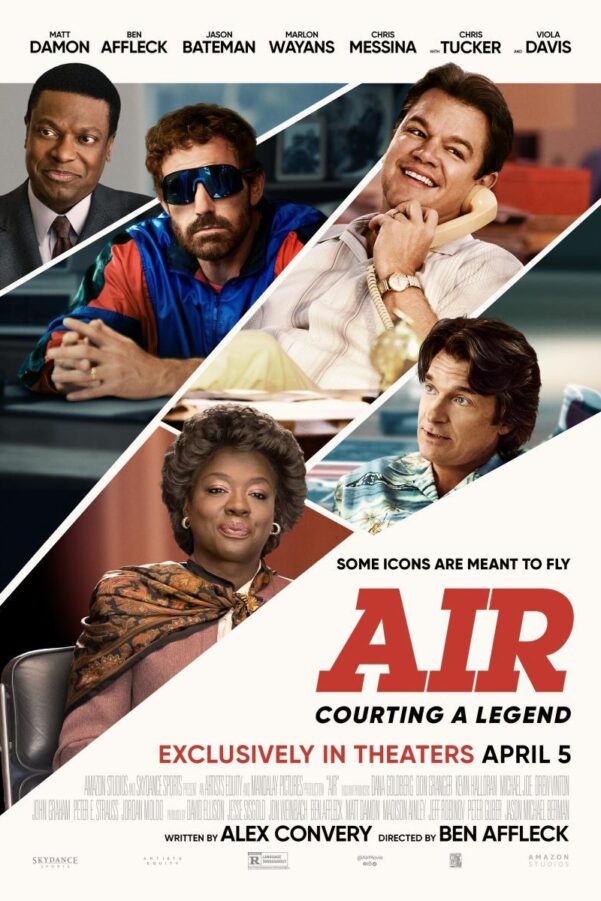
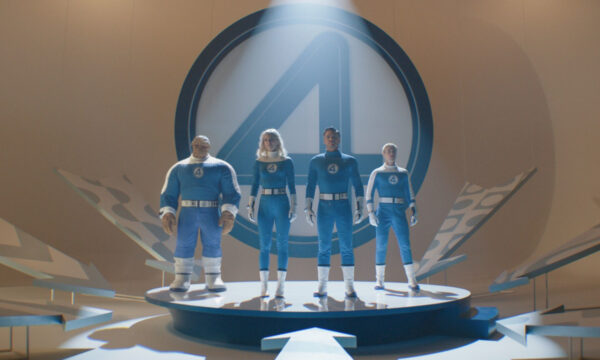
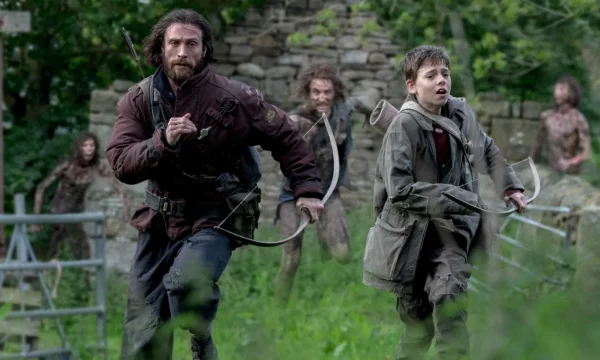
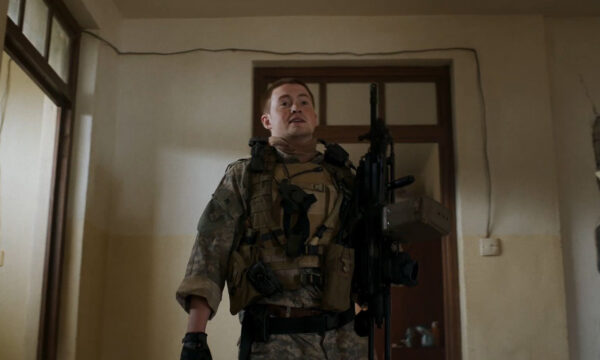

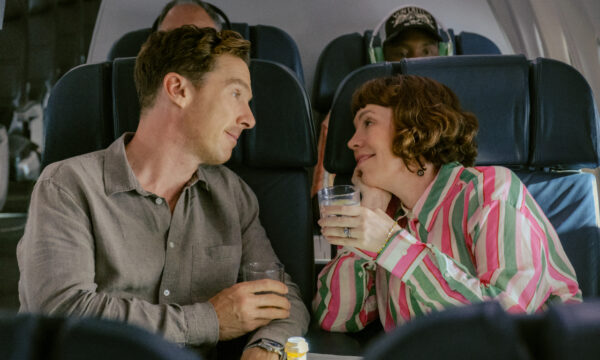
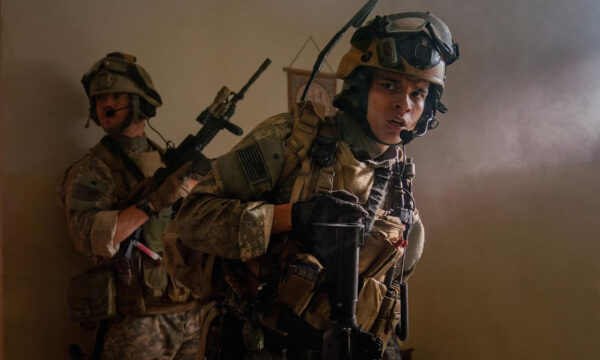
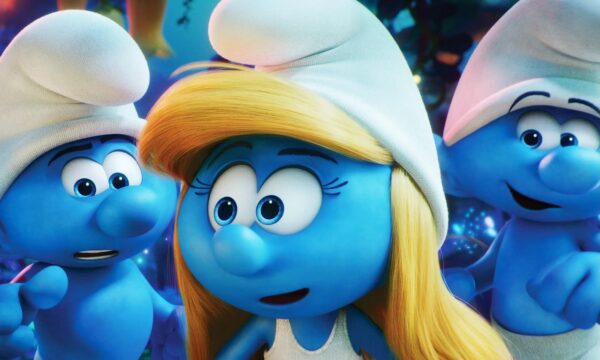
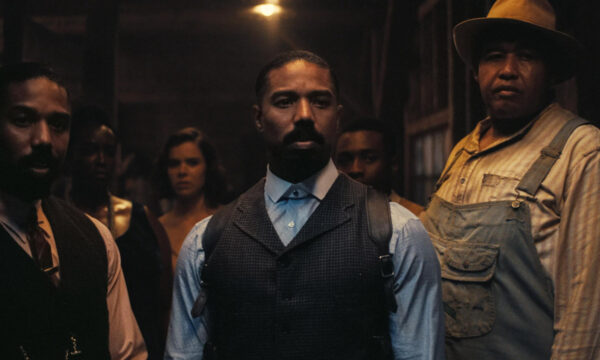
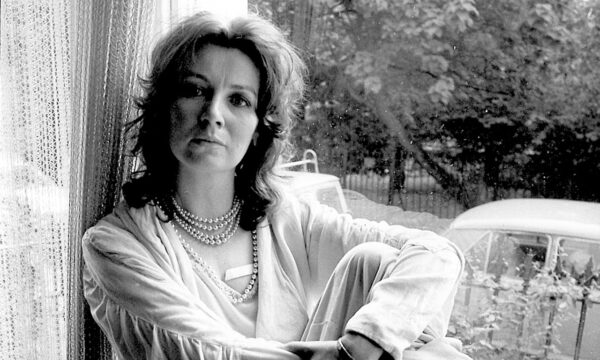















Facebook
Twitter
Instagram
YouTube
RSS